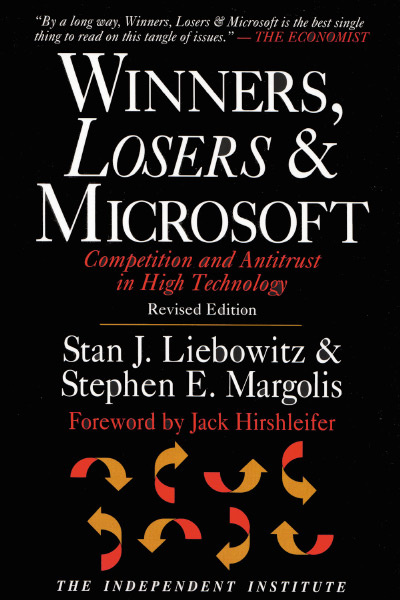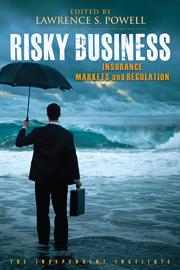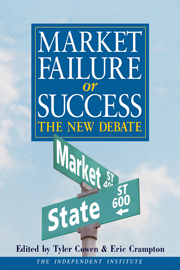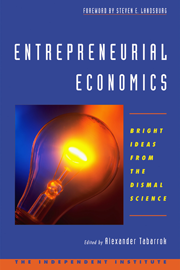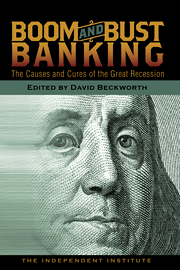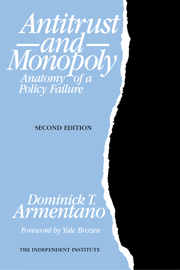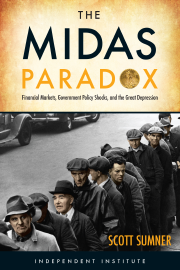| List Price: | ||
| Price: | $4.99 | |
| Discount: | $14.96 (Save 75%) |
| List Price: | ||
| Price: | $4.99 | |
| Discount: | $14.96 (Save 75%) |
Overview
Have the antitrust actions by the Department of Justice against Microsoft and other firms really intended to protect consumers, or are they politically motivated attempts to help competitors achieve what they could not achieve in the marketplace?
Can dominant companies in a market, such as Microsoft, “lock in” inferior technologies and thereby stifle innovation and would-be competitors?
Do “network effects”—the fact that some products, such as telephones and fax machines, increase in value as more people use them—result in monopolies even if dominant companies do not seek to create monopolies?
Do the current antitrust laws discourage entrepreneurship and innovation?
Will the robust high tech competition and tremendous technological advances of recent years continue if government steps up its antitrust actions?
Winners, Losers & Microsoft addresses such questions and sheds light on the real workings of the high tech markets. Through extensive research and insightful analysis, Professors Liebowitz and Margolis shatter many long-held beliefs about competition in the high technology industries. Among their surprising findings:
- Software prices fall dramatically in markets where Microsoft is a major player, but prices show no strong tendency to fall over time if Microsoft is not a factor in a given market.
- Claims that dominant but inferior technologies can “lock out” better competitive products are not supported by the data. This not only applies to software, but also to other technology markets (i.e. VHS vs. Beta video recorder battles).
- Superior products tend to dominate in high technology, even if inferior products are backed by lots of money. For example, Intuit’s Quicken has dominated Microsoft Money for several years despite intensive efforts by Microsoft to promote Money. And AOL has significantly increased its market share in recent years even through Microsoft incorporated software for the Microsoft Network into its Windows operating system.
Liebowitz and Margolis demonstrate how a high-tech company can go from a dominant market leader—as Lotus once was in spreadsheets—to an also-ran with astonishing speed. They show that free markets in high technology do a remarkable job of continually delivering better products at lower prices to consumers.
Winners, Losers & Microsoft makes a compelling case that the real danger to American high technology leadership is a too powerful, too intrusive government which believes it knows consumer preferences and needs better than they do. This book is a cogent, tightly argued rebuttal to frequent calls for greater government intervention in the high technology markets.
Award:
Amazon.com #1 Bestseller (Antitrust) (1999)
Contents
- Foreword
- Preface to the Revised Edition
- Section I: The Paradigm
- Chapter 1: Networked World
- Chapter 2: The Fable of the Keys
- Section II: The Theory
- Chapter 3: Theories of Path Dependence
- Chapter 4: Network Markets: Pitfalls and Fixes
- Chapter 5: Networks and Standards
- Section III: The Real World
- Chapter 6: Beta, Macintosh, and Other Fabulous Tales
- Chapter 7: Using Software Markets to Test These Theories
- Chapter 8: Major Markets—Spreadsheets and Word Processors
- Chapter 9: Other software Markets
- Chapter 10: The Moral
- Appendices
- Appendix A: Networks, Antitrust Economics, and the Case Against Microsoft
- Appendix B: The Trial
- Bibliography
- Index
- About the Authors
Detailed Summary
- Judge Jackson’s ruling in the Microsoft antitrust trial relied heavily on theories of market “lock-in,” which allege that competition is lax in industries that exhibit increasing returns due to “network effects.” WINNERS, LOSERS & MICROSOFT, first published in 1999, shows that “lock-in” theories are theoretically flawed and empirically unfounded.
- This revised edition of WINNERS, LOSERS & MICROSOFT includes an extensive analysis of Judge Jackson’s findings, showing how they fail to overcome Liebowitz and Margolis’s powerful critique of lock-in theory, including the cases of the QWERTY typewriter keyboard, the VHS video tape format (over the supposedly superior Beta format), and Microsoft’s operating system. It also shows that the proposal to split Microsoft into separate companies (Applications and Operating Systems), and ban them from working together for ten years, would impose costs on consumers, and waste on the industry, while reducing competitive and innovative.
- Judge Jackson argued that the Microsoft Windows operating system owes its market success to the fact that so many applications are written for it. But this lock-in theory (or “applications barrier to entry,” as the judge called it) is hard to reconcile with the fact that Windows beat out IBM’s OS/2, which included a browser, had many applications written for it, and was substantially similar to Windows.
- Jackson contended that Microsoft sought to protect an effective monopoly in desktop operating systems by reducing Netscape’s considerable market share. Jackson assumed that Java applications might someday operate off of Netscape, thereby making the underlying operating system irrelevant. But this premise requires a leap of faith, say Liebowitz and Margolis: “No middleware program has ever become a platform for mainstream programs or a serious alternative to an operating system.”
- Would breaking up Microsoft strengthen alternative operating systems or help create new ones? History suggests otherwise. To date, no major desktop applications have been profitably ported to Linux. And never has a dominant application in an important market prompted a movement toward an OS function for that application. Thus, there is no evidence to support Judge Jackson’s claim that a separate Microsoft Applications would undermine the market share of Windows.
- The Justice Department’s expert acknowledged that breaking up Microsoft would likely result in higher prices because there would exist two profit-maximizing companies making complementary products instead of one. More importantly, there is no guarantee that the two companies would both employ the low-price, high-volume strategy that Microsoft has employed.
- Judge Jackson’s provision to allow computer makers (for three years) to choose which components of Windows to install on their computers threatens consumer welfare by eliminating the efficiencies that come from having standardized operating system. Computer makers would not be required to disclose to consumers when they are selling threadbare versions of Windows.
- Judge Jackson’s “no-trade” clause between Microsoft Applications and Windows threatens to reduce innovation in Windows. For example, efficiency would likely be improved by allowing Windows to incorporate voice-recognition code, but under Judge Jackson’s proposal, Windows and Microsoft Applications would be prohibited from working together to produce complementary voice-recognition products.
- Microsoft’s current dominance in software markets is not evidence of an illegal monopoly: In markets where Microsoft dominates, it has the best products based on independent reviews and evaluations. Where it does not dominate, other firms have superior products.
- Software prices fall dramatically in markets where Microsoft is a major player: If Microsoft is not a factor, prices show no strong tendency to fall over time.
- Assertions that technology industries get “locked-in“to low quality products are unfounded: These include claims that Beta was better than VHS, that QWERTY was a bad keyboard designed to slow down typing, and that DOS was a poor operating system.
- In high-tech markets, good products replace bad ones very quickly: Surveys of magazine reviews show conclusively that Excel was considered superior to Lotus 1-2-3 and that Microsoft Word for Windows was recognized as a clearly superior product to WordPerfect.
- Magazine reviews are the key factor in determining market share for software products: While winning 28 spreadsheet reviews to Lotus 1-2-3’s single win, Excel gained 80 market share points in nine years. Similarly, while winning 16 reviews compared to WordPerfect’s 2, Microsoft World for Windows gained 65 market share points in seven years.
- Where its products have been inferior, Microsoft has failed: Microsoft Money has not taken market share from Quicken, which gets the best reviews for personal finance software. In online services, the Microsoft Network (which consistently scores poorly in reviews) has seen AOL’s market lead grow by 30 points in two years.
The “mousetrap principle”—build a better mousetrap, and the world will beat a path to your door—is one of the basic assumptions of our economy.
Recently, however, new theories that have percolated in academic writing and into public policy have questioned this principle. Some people believe a property known as “path dependence” can “lock-in” inferior products and “lock-out” innovative newcomers. Many feel that Microsoft is a prime example of a company triumphing through such “path dependence.”
In WINNERS, LOSERS & MICROSOFT: Competition and Antitrust in High Technology, Stanley Liebowitz and Stephen Margolis examine the theory and evidence of path dependence, and assess whether Microsoft and other highly successful high technology companies have made use of “lock-in.” Their conclusions are surprising. Instead of “lock-in,” they find that competitive advantages in high tech are short-lived and temporary. The best way to promote competition and innovation, they conclude, is not through antitrust action but instead by relying on the competitive entrepreneurship of free markets. The result is a book that is both a superb examination of the economics of information technology and a case study of how government policies solely based on abstract theories devoid of solid empirical evidence can produce great harm.
Lock-In, Path Dependence and QWERTY
In a nutshell, lock-in supposedly happens when many other people use the same product (like a telephone or VCR) and it becomes a de facto standard. “Network” effects from this standard (such as more movies being available on VHS if VHS is the most widely used standard) mean consumers want products adhering to that standard. Consumers will be reluctant to try new products diverging from the standard.
This possibility is the problem that path dependence theory alleges. It is this exception to the mousetrap principle. The lock-in problem is said to explain the success of the everyday QWERTY typewriter keyboard, the VHS video tape format (over the supposedly superior Beta format), and Microsoft’ s operating system.
That’s the theory. But does the real-world evidence support the theory? In WINNERS, LOSERS & MICROSOFT, Liebowitz and Margolis begin with a survey of various path dependence claims, and find that almost all are little more than “urban legends.” Especially dramatic is their exposé of the myth of the Dvorak keyboard. That myth holds that the QWERTY keyboard that most of us use is terribly less efficient than the Dvorak keyboard, which was developed about seventy years later. According to the myth, the superior Dvorak keyboard was “locked-out” because of the domination of QWERTY. However, Liebowitz and Margolis conclusively show the Dvorak keyboard offers no advantage over QWERTY, and claims for Dvorak’ s superiority are mainly based on spurious research by someone with a financial interest in the success of the Dvorak keyboard.
Gaps in the Logic of “Lock-In”
Leibowitz and Margolis show why true examples of harmful lock-in are very hard to find. Path dependence theories, the authors show, leave out important steps real people take to deal with real problems. Foresight, communication among consumers, consumer magazines, marketing efforts, moneyback guarantees and other entrepreneurial efforts all work to prevent lock-in. If we all really knew that a new product was sufficiently better, and we all knew that we all knew, wouldn’t someone find a way to help us switch? Liebowitz and Margolis argue it is extremely likely that someone would, especially since in doing so, there will be money to be made.
Do Real Markets Lock-In Inferior Products?
WINNERS, LOSERS & MICROSOFT looks at evidence from the real world. First, it considers a number of the cases alleged to demonstrate that lock-in occurs. The competition between Beta and VHS is examined, followed by the battle between the Macintosh and the IBM PC and several other rivalries. Liebowitz and Margolis show that in case after case, alleged lock-ins are not really lock-ins at all.
The authors then examine the market for personal computer software the focus of the decade’ s most infamous antitrust case and a key reason for the attention paid to path dependence theories. This industry has networks, an urge for compatibility, and ordinary economies of scale all of the preconditions of lock-in. Surely, if theories of networks, lock-in, or path dependence apply anywhere, they ought to apply here.
Liebowitz and Margolis draw on market data on product sales, as well as a large body of independent product reviews, to show several important results. Areas examined include spreadsheets, word processors, office suites, desk-top publishing, tax financial packages and browsers.
Applications software markets, the authors note, are often dominated by a single product. That finding, which should not surprise anyone, is consistent with network effects’ increasing returns. But the book also demonstrates two important points that may be surprising. First, while these markets do tend to be dominated by a single firm, market leaders are often replaced and the replacement often occurs with astonishing speed. Second, replacement occurs when a product comes along that is clearly superior, as revealed in product reviews in the leading personal computer magazines. These circumstances are nothing like lock-in.
Another surprise is what happens in markets with “locked-in” leaders. Traditional “structuralist” views of economics, as well as theories of lock-in, predict that locked-in market leaders could, and would, raise their prices. However, prices do not seem to rise as market leader is established.
Microsoft and Antitrust
Of particular relevance to current antitrust controversies, Liebowitz and Margolis find that, in markets in which Microsoft has an important presence, prices fall more rapidly than in other applications markets. Further, in the market for Macintosh applications, which Microsoft dominated very early, prices for Microsoft’s applications have been lower than they have been in the Windows applications market.
Liebowitz and Margolis also examine several antitrust issues raised in the Microsoft case. Among other things, they argue that bundling of software a key issue in the Microsoft case is unlikely to be a profitable strategy unless it provides consumer benefits. They also argue that adding functionality to software (which is what bundling is) is a fundamental and inevitable characteristic of progress in this industry.
They also consider the highly speculative claim that Microsoft’s position in the software industry is a threat to innovation. Leibowitz and Margolis conclude that the real threat to progress is an environment in which government rules determine what can and what cannot be included in software products.
Finally, they note that elevated prices and restricted output are the monopoly harm that antitrust might constructively address. These conditions are not present in the personal computer software industry.
WINNERS, LOSERS & MICROSOFT is a fresh, thought-provoking, and powerful look at how high technology markets really work and the true dynamics of high technology innovation and competition.
Praise
“Our ‘Economics’ focus discussed ‘The Fable of the Keys,’ a paper by Stan Liebowitz and Stephen Margolis, which showed that the QWERTY story was, because the standard layout is not in fact, demonstrably worse than the alternatives. This cast doubt on the whole new-theory movement. Now the authors brought out a book, Winners, Losers & Microsoft. It includes the keyboard paper but moves on from that, by way of a close look at the software industry, to a broader and deeper attack on the would-be heretics. By a long way, it is the best single thing to read on this tangle of issues. The book reviews the new theory carefully and in language accessible to the general reader, and then subjects it to a detailed empirical examination. At the end, very little of the fashionable critique of neoclassical economics is left standing. . . . Turning to the actual evidence, again and again, they show that good products win. The standard lock-in stories are examined and, like QWERTY before them, debunked. . . . Unsurprisingly, in view of all this, the authors take Microsoft’s side in the firm’s battle with the Justice Department. Their view of that endlessly complicated issue, set out in an appendix, is not so much a resounding acquittal as ‘case not proven’ — but they would say this should suffice. The case they make against the path-dependence paradigm as a way to see the world could hardly be stronger: it is a big idea that simply fails to stand up.”
—THE ECONOMIST
“Winners, Losers & Microsoft gives ‘path dependence’ a cold shower and sheds much-needed empirical light on the success story we call Microsoft. The book is a pleasure to read, in no small part because Liebowitz and Margolis serve up course after course of exquisite historical and institutional detail. If you want to know the real reason we use QWERTY instead of the Dvorak keyboard and why we watch videos on VHS instead of Beta, read this book.”
—GEORGE N. BITTLINGMAYER, Wagnon Distinguished Professor of Economics, University of Kansas
“Winners, Losers & Microsoft features what appears to be the first systematic look at the real-world history of the software industry — and the results are sure to give Department of Justice trial attorneys the heebie-jeebies. An invaluable addition to the bookshelf of anyone interested in the Microsoft trial and future high-tech antitrust cases, the book is the best compilation that anyone’s offered.”
—WIRED NEWS
“Powerful stuff, Winners, Losers & Microsoft promises to have an important impact on the debate about the appropriate use of antitrust in high-technology markets. It does indeed exhibit a very high caliber of scholarship, addresses the key questions posed by the proponents of anti-competitive ‘lock-in’, and bases its conclusions on a wealth of new empirical evidence.”
—WILLIAM F. SHUGHART II, Barnard Distinguished Professor of Economics, University of Mississippi
“If only the Clinton Justice Department read Winners, Losers & Microsoft, the American economy would be spared much pain and legal expense. Stan Liebowitz and Stephen Margolis really know their stuff, and they can write too.”
—PAUL GIGOT, Columnist, The Wall Street Journal
“Winners, Losers & Microsoft collects in a single volume the impressive scholarly work of Stanley Liebowitz and Stephen Margolis on network effects and path dependence. The authors’ approach is in large part an empirical approach, and responds with evidence to empirically unsupported assertions about the ubiquitous nature of what the authors define as ‘third-degree path dependence.’ In addition, the authors also provide useful clarifications of misconceptions contained in the academic literature (e.g., differentiating network effects from network externalities) and providing more precise definitions of path dependence. The book also contains compelling new evidence on competition in computer software application markets. Winners, Losers & Microsoft will be an extremely important and useful book.”
—BRUCE H. KOBAYASHI, Professor of Law, George Mason University
“In Winners, Losers & Microsoft, economists Liebowitz and Margolis present powerful evidence that Microsoft lowered prices.”
—NEWSWEEK
“Stan Liebowitz and Stephen Margolis’s excellent book, Winners, Losers & Microsoft, deals with the important and subtle phenomenon of path dependency. Path dependency is important because it influences the development of many firms and markets. The economic interpretation to be placed on path dependency, however, is subtle. Liebowitz and Margolis counsel against the readiness with which many economists ascribe inefficiency to path dependency. Because the reference condition of a hypothetical ideal can never be implemented, the relevant, comparative institutional standard for judging efficiency is always in relation to feasible alternatives. This is a recurrent theme.”
—OLIVER E. WILLIAMSON, Edgar F. Kaiser Professor of Business Administration, Professor of Economics and Professor of Law, University of California, Berkeley
“The fascinating history and analysis in Winners, Losers & Microsoft can guide us toward a better understanding of the newer forms of competition that have been mainly responsible for the success of the modern American economy in recent decades.”
—JACK HIRSHLEIFER, Professor of Economics, University of California, Los Angeles
“Respected economists Stan Liebowitz and Stephen Margolis use plenty of statistics to examine the key tenets surrounding the Microsoft antitrust trial. Their research makes a compelling case and argues that their voluminous research proves that consumers don’t get ‘locked in’ to inferior standards, à la the popular economic theory of ‘network effects.’”
—INDUSTRY STANDARD
“Economists too often adopt a clever idea without seriously examining the evidence, especially if the idea suggests a ‘market failure’ requiring some regulatory remediation. Winners, Losers & Microsoft is an impressive and important antidote to that tendency in the case of ‘path dependence.’ This is the idea that markets can get locked into an inferior technology simply because of historical accident—and, of course, that government must rescue us from the burden of that history. While most economists will acknowledge the possibility none have examined the evidence as carefully as Liebowitz and Margolis. They show convincingly that the important supposed examples of path dependence are built on a factual house-of-cards. They also vividly show how market forces overcome inefficient path dependence. This is something most advocates of the idea have ignored. Everyone interested in public policy toward ‘network’ and high technology industries will want to read this excellent book.”
—SAM PELTZMAN, Professor of Economics, Graduate School of Business, University of Chicago
“Innovative and utterly convincing, their dismantling of commonly accepted myths about the QWERTY typewriter keyboard and the VHS-versus-Beta video struggle makes fascinating and illuminating reading.”
—AMERICAN WAY
“Leibowitz and Margolis’ Winners, Losers & Microsoft is instructive for all participants—the judge, defendants, plaintiffs and experts in the DOJ vs. Microsoft tragicomedy. For the rest of us, including Microsoft customers and competitors, it is not too late to learn, as well as be entertained by, the Liebowitz-Margolis explanation and histories of several presumptive ‘monopolies’ of ‘networks’ and ‘entrenched universal users’.”
—ARMEN A. ALCHIAN, Professor of Economics, University of California, Los Angeles
“In Winners, Losers & Microsoft, authors Stan J. Leibowitz and Stephen E. Margolis dissect an essential issue of freedom: Should we be able to buy what we like, or should some higher life form sort out the complications of the marketplace and ‘rationalize’ them for us? After all, we consumers aren’t too smart: We chose the QWERTY keyboard over the ergonomically superior Dvorak keyboard, the blurry VHS standard over the crystal-clear Beta alternative, and the clumsy IBM PC over the superior Apple platform. Fortunately, we have the Department of Justice to sue the bad guys, like Microsoft. With a victory over Microsoft, Janet Reno can make a statement about business justice as powerful as the statement on social justice she made at Waco. But don’t we have the right to make ‘stupid mistakes’ like buying QWERTY keyboards, PCs, and VHS recorders? Or are we victims of ‘market failure.’ the problem that occurs when a product gets so much momentum it gets ‘locked in,’ forcing us to buy it against our own self-interest? Such is the convoluted logic of the Nanny State, which seeks to protect us from our own ignorance. Despite my Stanford Ph.D. in Electrical Engineering, it seems I was duped into buying 3,000 copies of Microsoft Windows by crafty Bill Gates. Leibowitz and Margolis show with data—not politically correct illogic—that QWERTY, VHS, and the PC were the right choices. And that the market—not the government—was right.”
—T. J. RODGERS, Chairman and Chief Executive Officer, Cypress Semiconductor Corporation
“Henceforth, any judges, economists, pundits or journalists who discuss Microsoft or technology lock-in without first dealing with the Liebowitz-Margolis critique should have their wrists soundly slapped by.”
—THE WALL STREET JOURNAL
“In Winners, Losers & Microsoft, Liebowitz and Margolis take aim at the common understanding of network effects—in particular, the belief that vast user bases and compatibility can allow inferior technologies to drive superior ones out of the marketplace. Their arguments, such as their history of software applications, will be of interest to executives in virtually any field.”
—UPSIDE
“In Winners, Losers & Microsoft, Liebowitz and Margolis argue that path dependence is something of a myth, or at least far less important than Microsoft-bashers make out. . . . Ironic, isn’t it, how often anti-monopoly actions to correct alleged market failures end up hurting the little guy?”
—FINANCIAL TIMES
“Paul David, a Stanford economist, made the an idea famous in a 1985 article about the QWERTY typewriter key configuration, which, he claimed, was inferior to one designed by August Dvorak. Yes, as Stan Liebowitz and Stephen Margolis point out in a 1990 article—and at length in their new book, Winners, Losers & Microsoft—there was little basis for QWERTY’s alleged inferiority. Liebowitz and Margolis tracked down the study and found it deeply flawed; it was also, they noted, directed by none other than Mr. Dvorak. But many economists continued to use the QWERTY example for years after Mr. Liebowitz and Mr. Margolis’s 1990 article. Brian Arthur, an economist and one of the leading proponents of the idea that network effects lead to market failure, has argued that the supposedly inferior VHS video format won the battle with Beta because of network effects. However, Mr. Liebowitz and Mr. Margolis counter in their book that despite Beta’s initial two-year advantage, VHS overtook it six months after being introduced to the U.S. market.”
—RED HERRING
“Winners, Losers & Microsoft is a timely book on competition and antitrust issues in high-technology industries. It is highly recommended for managers interested in a better understanding of the impact of network effects, technology lock-in, and path dependence.”
—JOURNAL OF PRODUCT INNOVATION AND MANAGEMENT
“In their book, Winners, Losers & Microsoft, economists Liebowitz and Margolis argue that not only did Microsoft’s products earn superior reviews, their entry into the market sent prices plunging. This is what the Justice Department is protecting the world from? Better products and lower prices?”
—WASHINGTON TIMES
“Liebowitz and Margolis have done research on intellectual property issues for over two decades. Their work on new technologies began over a decade and a half ago. Their piece on the Fable of the Keys, was the lead article in the Journal of Law and Economics in 1990. Unfortunately, their other work on path dependency has languished in less well-known journals. It is a wonderful asset finally to have all their work on technological lock-ins put together in this one volume, and accessibly written for anyone who is interested in the topic. I’ve been a long-time Microsoft user/hater, but I find most of the arguments put forward by the authors to be very compelling: When MS products receive top ratings, those products tend to dominate the market and prices fall. I’m not sure I agree with most software reviewers that MS IE is better than Netscape, but perhaps that’s a personal preference. But as I said, this book is a superb and accessible summary of the authors’ work on path dependency and is a telling condemnation of BOTH sides in the antitrust suit against Microsoft.”
—JOHN P. PALMER, Professor of Economics, University of Western Ontario, Canada
“Liebowitz and Margolis investigate whether the build-a-better-mousetrap style of competition has been replaced with path-dependence, which can lock in inferior products and lock out innovative newcomers. They argue that competitive advantage in high technology is short-lived, and that the best way to promote competition and innovation is to trust free-market entrepreneurs rather than take antitrust action.’”
—BOOK NEWS
“Stephen Margolis, the head of North Carolina State University’s Management department, has a unique perspective on Bill Gates’ legal troubles in the wake of last week’s federal antitrust ruling against Microsoft. Margolis is the co-author of a 1999 book on the computer giant, entitled Winners, Losers & Microsoft: Competition and Antitrust in High Technology. The book’s subject matter is the research Margolis and co-author Stan Liebowitz, former N.C. State economics professor and current professor of economics at the University of Texas-Dallas, began in the late 1980s. . . . ‘I think both the DOJ and Judge Jackson have become concerned about the possible damage to the country from structural remedies,’ said Margolis. In his opinion, other computing corporations are not likely to benefit a great deal from the ruling. Conduct remedies could create a weaker Wintel (Windows-Intel) system, which would make other companies’ products less valuable. . . . ‘I think the litigation is not likely to be helpful to consumers or producers,’ said Margolis.”
—UNIVERSITY WIRE
“The basic argument of Winners, Losers & Microsoft, is that we should all be happy that Microsoft dominates the market for PC operating systems, word processing, Web browsers, and other software. Indeed, economists Stan Liebowitz and Stephen Martgolis reveal, Microsoft products are so superior, and so useful when networked together, that we have collectively decided to give the company a virtual monopoly. They assert that in a free market, lock-in is impossible. The pattern they see is one of benign ‘serial monopoly’ in which the firm with the best product dominates for a time, but is eventually displaced by one with a better product . . . . Maybe Liebowitz and Margolis are right and maybe, as they complain, we journalists are simply ‘quick to file the bad-news stories of how the world is not only unfair, but also illogical.’”
—TECHNOLOGY REVIEW
“Economists Liebowitz and Margolis find no convincing examples that network effects are at all important in establishing and maintaining monopoly of inferior products. This excellent volume is recommended for academic and professional collections.”
—CHOICE
“Liebowitz and Margolis provide historical evidence to show that the most familiar claims of lock-in, such as Beta vs. VHS, and Macintosh vs. Windows, are based on faulty evidence. After carefully examining the software market, that also conclude that firms can succeed only if their products represent the superior technology. Winners, Losers & Microsoft is very useful in understanding issues related to market structure and antitrust activity in the high-tech industry. The implications of their analysis are important and suggest that the consequences of Judge Thomas P. Jackson’s decision against Microsoft may be a reduction in the welfare of consumers.’”
—LOUISVILLE (KY) COURIER-JOURNAL
“In Winners, Losers & Microsoft, Stan Liebowitz and Stephen Margolis present overwhelming evidence that Microsoft earns its large market shares by offering good-quality prices at attractive prices. No economist (or team of economists) has produced during the 1990s research that is as compelling, as exciting, as important, and as well-grounded in both theory and data as that of Stan Liebowitz and Stephen Margolis. These guys’ work is truly and deeply impressive. And their writing is a joy to read. They tackle some of the most challenging issues at play in modern economics — and they succeed brilliantly! Because of the research these two scholars produced earlier in this decade, it is inexcusable for anyone to trot out the success of the QWERTY keyboard or that of the VHS tape as examples of ‘inefficient lock-in.’ Because of the research they have done, and report clearly, in this new book, it is now inexcusable for anyone to claim that Microsoft’s market success is due exclusively — or even principally — to ‘path-dependency’ or ‘inefficient lock-in.’ Liebowitz and Margolis show beyond any reasonable doubt that in those markets where Microsoft achieves and maintains a large market share, it does so by offering consumers deals that consumers fine attractive. Period. Winners, Losers & Microsoft is economics at its finest and most relevant.”
—DONALD J. BOUDREAUX, Professor of Economics, George Mason University
“In ‘The Fable of the Keys,’ Liebowitz and Margolis argue that they had added to the contributions of Cheung and also of Ronald Coase who showed that contrary to a standard example, private groups successfully built and operated lighthouses. The authors therefore went on to examine more cases and to develop further the underlying theoretical case against path dependence. Winners, Losers & Microsoft is the fruit of their efforts. Case studies comprise the bulk of the book and make interesting reading. Liebowitz and Margolis also extensively examine the principal application programs used on desktop computers.”
—REGULATION
“The resourceful antitrust community has simply gone ahead and reinvented itself by developing several new theories and an entirely new approach to evidence. It is in this context that Winners, Losers & Microsoft appears at a most opportune moment, indeed. This carefully written and thoughtful book is devoted to a critical examination of these new theories and to a search for evidence, any evidence, that these new theories can support antitrust. The devastating criticism by Liebowitz and Margolis of the newer market-failure theories occupies the first of their book. . . . The second half of the book is a series of case studies that aim to demonstrate the correctness of their theoretical conclusions. . . . The case studies are fascinating. . . . The last chapter in the book, an appendix, is devoted to the current government antitrust case against Microsoft. Liebowitz and Margolis argue persuasively that the government’s case is intellectually wrong-headed with potentially disastrous economic consequences. They shred the government’s theories of monopoly leverage, tie-ins, predatory bundling, and underscore the fact that the government has no evidence whatsoever that Microsoft has restricted outputs or raised prices. . . . This is an intelligent book that does much to demonstrate that the antitrust emperor wears no clothes. What the authors choose to say they say clearly and persuasively. Especially welcome is their central theoretical theme: That the market is a process that worked efficiently for consumers and that the competitive market process looks like a series of ‘monopolizing acts.’ . . . What they did say is intelligent and important and deserves the widest possible understanding. The stakes are very high; regulatory control of product innovation in high tech industries would be disastrous. Professors who teach industrial organization and all judges who judge antitrust cases, will profit immensely from reading this book.”
—QUARTERLY JOURNAL OF AUSTRIAN ECONOMICS
“For an extensive, interesting discussion of standards, autarky, and synchronization, see Winners, Losers & Microsoft: Competition and Antitrust in High Technology (The Independent Institute).”
—EAI JOURNAL
“Liebowitz and Margolis’s Winners, Losers & Microsoft is an all-out attack on the intellectual and empirical basis for ‘path dependence,’ with particular application to Microsoft’s role in the software market. The book serves a useful purpose in throwing cold water on the idea that markets routinely pick inferior technologies and in providing the first thorough summary of what really happens in software markets.”
—REASON
“In their book, Winners, Losers & Microsoft, Stan Liebowitz and Stephen Margolis argue that everyone seems to have forgotten that life is hard. They further contend that despite the hype of the Microsoft case, there remain fundamental economic principles governing the relationship between manufacturers and consumers, which limit and empower both sides of a transaction. This decisive critique of antitrust legislation claims that laws prohibiting monopolistic practices merely prolong the artificial lives of firms that will not or cannot produce more innovative services while they penalize other firms that do what business presumably is supposed to do, make products that make money. Liebowitz and Margolis clearly know the relevant literature and have a great capacity for critical synthesis. It is oddly appropriate, at this strange moment in our culture in the century, that the rapidly evolving, carnivalesque milieu of high technology has become the environment in which the entire culture is prepared to rethink 2,000 years of moral propriety so that it is not finally whether one wins or loses, but how one bundles the browser.”
—CREATIVE LOAFING
Author
Stan J. Liebowitz is Professor of Managerial Economics at the University of Texas, Dallas.
Stephen E. Margolis is Professor of Economics and Business at North Carolina State University.
Awards
Amazon.com
- #1 Bestseller in Antitrust

